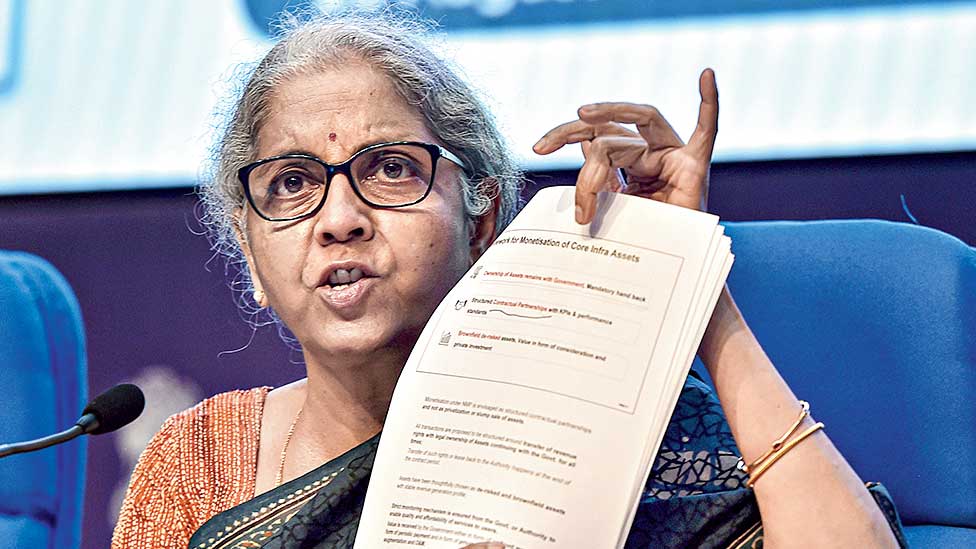Sold off
Sir — The Bharatiya Janata Party keeps saying that no development work was done by the Congress in 70 years. Yet, the finance minister, Nirmala Sitharaman, has now identified State assets worth at least Rs 6 lakh crore — these range from the power sector to road and railways — which she plans to disinvest through the recently unveiled National Monetisation Pipeline (“Sweating assets”, Aug 26). If the ruling party’s claims were true, then where did these assets come from?
According to the new scheme, the assets will stay with the government. Then why should multinational companies enjoy the profits? It is unfortunate that even after seven years of being in power, the Narendra Modi-led government remains incompetent when it comes to handling the economy. It is this failure that makes it hand over government assets to someone else to operate.
It is important that the ruling party sheds light on the details of the contracts — the modalities of the mandatory handback should be made clear. This would help both the private players and dispensations that form the government in the future. There is also a chance that the unrewarding experience of a few firms will discourage others from taking the plunge.
The common people are not happy with the government’s plan to virtually sell off assets built over 70 years to raise money. How much profit the government would actually make will depend on the rollout of the scheme. But the risk is that the country may effectively be left with no public sector.
Bidyut Kumar Chatterjee,
Faridabad
Sir — The National Monetisation Pipeline scheme announced by the Centre to raise Rs 6 lakh crore in the next four years by leasing out various assets is utterly unwelcome. Precious national assets would be served on a platter to private players for a pittance. Irrespective of the government’s claims about ownership and authority, the leased assets will be operated according to the policies of the private companies for the entire duration guaranteed by the contracts. Why can the government not continue to manage them efficiently, saving the assets and helping the public exchequer?
D.V.G. Sankararao,
Nellimarla, Andhra Pradesh
Sir — The present government has taken privatization to a different level. It has now come up with the National Monetisation Pipeline. This is an initiative to hand over State legacy to private players. This government has been claiming that it has no interest in doing business. But what is clear from its policies is that its primary duty is to protect businessmen.
With a massive chunk of the public sector being put in private hands, corporate enterprises will have a field day. They will run everything, from airports and railway stations to stadiums and coal mines. The government says that this will raise Rs 6 lakh crore in four years. But does it not also insist that all is well in the economy? If that is indeed the case, then what is the need to privatize State assets to raise money? The answer is that private investment has come to a standstill after demonetization. Demand has suffered a big blow, and the finance ministry has no clue how to resolve this crisis.
Jang Bahadur Singh,
Jamshedpur
Take care
Sir — The Bombay High Court has warned the Maharashtra government of strict action if even a single child in any of the tribal areas dies on account of malnutrition. It has ordered the state to depute specialist doctors in these areas to ensure that proper care is taken of pregnant women and infants.
The same yardstick should be applied to the migrant workers, who have suffered through the pandemic in order to meet the basic needs of roti, kapda and makaan. Civic care should also be extended to all during the pandemic. The court’s directive is truly a step in the right direction.
Akhila Gopalan,
Coimbatore
Hit the pedals
Sir — Calcutta has long been choking on account of air pollution. Studies show that vehicular emission is a major contributor to this problem. A simple solution would be to promote the use of bicycles. Yet, cycles are banned from plying on 64 of Calcutta’s arterial roads during most of the day. This month, cyclists from various walks of life came together to urge the authorities to remove this restriction. Attention must be paid to this plea. Removing these curbs in a planned manner — demarcating cycling lanes, for instance — would go a long way towards addressing the issues of pollution and traffic congestion that plague the city.
Dibyo Guha,
Calcutta











